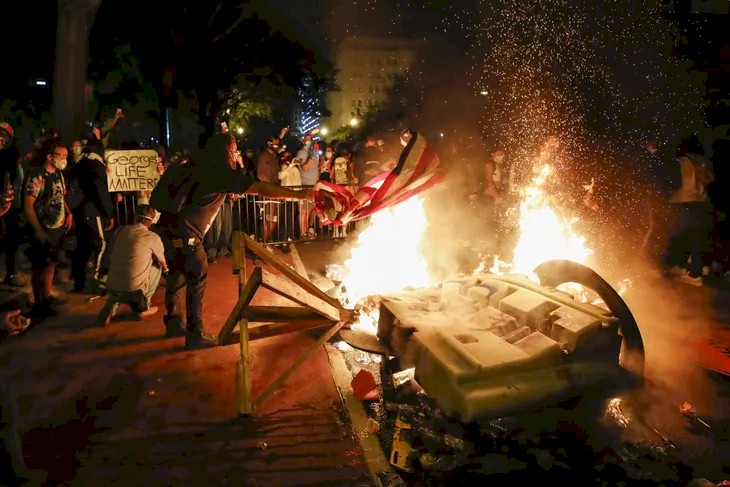From World Capital to Battleground
By Richard Fernandez
PJMedia.com

AP Photo/Alex Brandon
One of the problems with a Global World is that it implies the nations will eventually seek to elect the president of the world, AKA the president of the United States. Not surprisingly, foreign powers have their own presidential candidates. NPR quotes a top U..S intelligence official as saying China and Russia are backing horses in the November 2020 race. Others, like Iran, are just out to sow trouble.
William Evanina, who leads the National Counterintelligence and Security Center, said that the U.S. government has assessed that China prefers President Trump losing the election, because Beijing considers him “unpredictable,” while Russia is working to undermine Democrat Joe Biden. …
Iran also seeks to spread disinformation online, with the intent to undermine U.S. institutions and Trump, and to divide the country ahead of the election, according to Evanina.
They have probably been backing candidates for a long time, though never so openly as now. But as Roger Simon notes, if things have gotten this bad in Washington, then who in the establishment can be trusted to evict the foreign influencers? If the Russians and the Chinese are looking to control the White House they may have already compromised the intelligence agencies and the media.
After listening to three years of lies about Russiagate from the Department of Justice and the FBI, not to mention the State Department and various of our 17 (count ‘em) intelligence agencies, it’s hard to believe any arm of our government anymore.
Trust, but verify, Reagan told us. But how do we even do that?
Check the media? (I know—don’t make me laugh.)
Faced with a crisis in institutional reliability Simon suggests the voters resort to common sense and actual experience to decide the truth, in the same way that a person who no longer trusts the phone weather app might look out the window to see if the sun is shining. To the question of who is China’s stooge and Russia’s lackey, the answer is: “by their fruits ye shall know them.” Go with your gut.
That things have come to this indicates how weak the institutions have become. Although electoral controversies have long been a part of American history, they may matter less when the rivals are politically closer than when they are poles apart. If Kennedy “stole” the election from Nixon or GWB pipped Al Gore, the policy outcomes were not so staggeringly disparate as they are today. Attorney General Barr characterized Democrats as the “Rousseauian Revolutionary Party that believes in tearing down the system.”
“They’re not interested in compromise. They’re not interested in [a] dialectic exchange of views. They’re interested in total victory…It’s a substitute for religion.”
Doubtless the Democrats feel an equivalent contempt for Barr. Such is the chasm between them. The sharp divisions in U.S. political life provide a unique opportunity for China, Russia or even Iran to play a balance-of-power role. But there is danger for meddlers too, the most obvious example being the German operation to destabilize Czarist Russia in 1917 by sending Lenin to the Finland Station by sealed train. The very regime Germany hatched in 1917 returned to them big time in 1945.
Because he returned home by way of Germany — and with the obvious cooperation of the German High Command — which was then at war against Russia and her Entente allies (France, Britain and, from April 6, the United States), allegations that Lenin was a German agent were immediately hurled by his opponents, a charge that remains controversial to this day. If it is ever proved that Lenin was acting on behalf of the German Imperial Government in 1917, the implications for our understanding of the October Revolution, and the Soviet Communist regime born of it, which lasted until 1991, would be profound. This would amount to the greatest influence operation of all time, making present-day concerns about Russian meddling in Western elections, including last year’s American presidential contest, seem tame in comparison.
A Washington establishment unable to reboot itself needs an external force, ideally the voters, to press “reset.” If the voters fail, then reality will grow a finger and push the reset button some other way. With both sides seeking to implement revolutionary agendas on the backs of slim and evanescent majorities, neither side has the ability to overpower the other by main strength, so resolution is likely to hinge on external events that will give either side the decisive advantage. Contingent events likely to accelerate a reboot include but are not limited to:
- the course of the pandemic as modified by the availability (or non-availability) of an effective vaccine or the emergence (not impossible) of yet another pathogen;
- an economic or financial crash of some nation or region weakened by the virus shutdown;
- some military confrontation in the Middle East, the Taiwan Straits, the South China Sea or North Asia;
- a health episode involving the president of the U.S. after 2020.
Any of these events, or something completely unknown, could determine the trajectory of the rest of the 21st century. One of the most painful lessons of the coronavirus pandemic is how much of human history turns on pure blind luck. Perhaps this has always been true even in the halcyon End of History days, though never so obviously as now.
Someone on Twitter asked: “When the autopsy of
our great republic is released, what will be the
primary cause of death?” Who knows? You could flip
the question and ask: What is being born?

